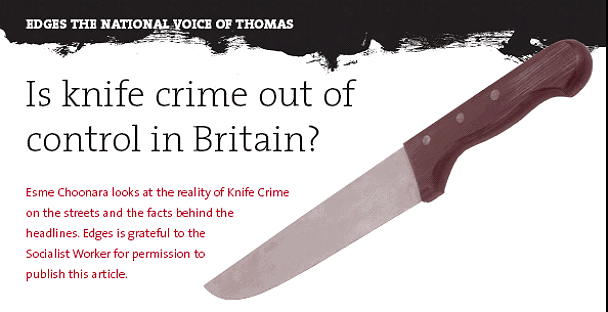 Knife crime is big news following a number of high profile stabbings over the past month. Metropolitan police commissioner Sir Ian Blair has called for mandatory sentences for anyone found in possession of a knife. Government ministers are reported to be considering increasing the maximum sentence for carrying a knife from two to five years. The newspapers have been full of police pictures of piles of confiscated weapons and officers posing with huge blades handed in during the current knife amnesty. If you believe the reports, you would think we are seeing a massive increase in fatal stabbings. Closer examination of the figures shows a different story. The home office doesn’t record separate figures for stabbings, but figures for homicide with a blade or sharp instrument show that annual rates have hardly changed in the past ten years. In 2004-5, 236 people were killed with sharp instruments, an increase of two from the previous year, and seven less than in 1995. The police report that nearly 3,000 people were victims of some form of knife crime last year, though many of these incidents were robberies or threats that did not result in any injury. Police statistics show that young men aged 16 to 24 are consistently the most at risk from violent attack. Victims of knife crime are also predominantly poor. Danny Dorling from Sheffield university has shown that the poorest 10 percent of society are 182 percent more likely to be murdered than the average citizen. He also found that poor people are most likely to be killed by stabbing. Much of the recent media coverage has focused on young people carrying knives.It is difficult to know for certain how widespread carrying knives is among young people, but in a 2003 survey for the Youth Justice Board 29 percent of London school students said they carried a knife. No one can be in favour of an increase in people carrying knives. The important question is – why do so many young people carry knives? Nik Brown, a 14 year old school student from Dundee, has a friend who was recently hurt in a knife attack. Nik told SocialistWorker, "I know quite a few people who carry knives. They carry them because they don’t feel safe. None of them would ever use them aggressively. " Jo Cardwell, who works with young offenders in east London agrees. She said, "The threat of longer sentences will not stop young people carrying knives. "Young people often carry knives in self defence – although, ironically, knives are often used against the people carrying them." Nik said, "Mandatory sentences for people carrying knives won’t deter anyone, because they don’t deal with why people carry knives. " Young people are targeted all the time and hassled by the police.We need to feel valued and integrated into society. People caught with knives need rehabilitation and help, not punishment." There is no evidence that increased sentencing would reduce knife crime. Keir McKechnie is a community worker in Glasgow. He said, "Knife crime is a big issue in Scotland, especially in Glasgow where we have seen a big increase in arrests for possession of knives. The number of people jailed for carrying knives in Scotland has gone up by 20 percent in five years. Tagging "This hasn’t reduced knife crime. Now the Scottish parliament is calling on the courts to take an even harder line on knife crime by locking up more kids and using electronic tagging on people found carrying knives. "Young people are sick of being judged and demonised. They don’t need more harassment from the police and the courts. They need support. "We don’t need more jail sentences.We need measures that could reduce violence in our communities – proper facilities and the prospects of good jobs." © Copyright SocialistWorker |